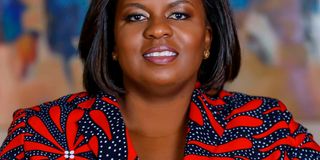Sanda Ojiambo: Trailblazer taking the global stage at UN

Sanda Ojiambo is the CEO and Executive Director at UN Global Compact, the world’s largest corporate sustainability initiative.
What you need to know:
- Sanda Ojiambo is the CEO and Executive Director of the UN Global Compact, the world's largest corporate sustainability initiative.
- Her inspirational journey took her from working in war-torn Somalia with NGOs to leading at Safaricom before this UN role.
- At UN Global Compact, she is driving initiatives to make businesses more sustainable, inclusive and responsible on a global scale.
Four years ago, Sanda Ojiambo, then the head of Sustainable Business and Social Impact at Safaricom, received a life-changing call. Following a rigorous international search, she had been chosen to lead the UN Global Compact, the world’s largest corporate sustainability initiative, as its CEO and Executive Director.
In a conversation with nation.africa, Ojiambo shares insights on her path to leadership and her successes at the helm of this global organisation.
*****
I am immensely privileged and honoured to have the opportunity to lead the UN Global Compact based in New York, United States. It’s an immense privilege to advocate for the private sector in the United Nations.
My undergraduate studies were completed in Canada, and I pursued graduate school in the United States, focusing on economics and public policy. I was driven by a keen interest in understanding the dynamics of global economies and policies.
Before this appointment, I spent 12 years at Safaricom where the company was a UN Global Compact participant.
Career
I began my career in the non-governmental organisation (NGO) sector, with my first job taking me to Somalia. I worked in Southern Somalia, amidst challenging conditions, but found the work deeply fulfilling as we operated both at the community level, through to the macro economy. I worked across various programming areas from health, education, economic empowerment and even at one point, I coordinated a demining program.
Later, I worked for UNDP where I was fortunate enough to be part of a team that developed the first-ever Somalia Human Development report for Somalia. After Somalia, I spent six more years working in women’s health across the continent, in various capacities.
Thereafter, I took a break from the NGO sector and transitioned to Safaricom where my initial role involved heading the Safaricom Foundation. Here, we engaged with communities to understand their needs and partnered on delivering community-based solutions to improve the quality of their lives. This extended through to the Mpesa Foundation and later to leading a team that focused on Sustainable Business as well as Technology for Development (developing mobile based solutions in education, agriculture, and healthcare)
Safaricom was a member of the UN Global Compact and through our Sustainable Business portfolio, we began to engage with UN Global Compact and other parts of the United Nations on the company’s “Transforming Lives” agenda.
UN Global Compact
I joined the UN Global Compact in June 2020, and moved to New York in September 2020, amidst the pandemic. I am pleased to say that despite the adverse outlook for business during the pandemic, the private sector membership within the UN Global Compact almost doubled between 2020 and 2023. We now stand at more than 20,000 business participants.
In 2021, we developed a new global strategy and embarked on a regional growth model, establishing regional hubs in Abuja, Dubai, Panama City, and Bangkok, to bring us closer to the businesses we work with. In addition, over the last three years, we've launched an active Small and Medium Enterprise (SME) program, addressing the specific sustainability needs of these enterprises, which play a critical role in global economies and supply chains.
We've made significant strides in advancing our Ten Principles on the environment; human rights, labour and anti-corruption and have developed our programming in areas such as water stewardship, oceans, gender, sustainable finance.
Our programmes and partnerships support businesses and business leaders to make more robust business decisions to enable them to be more competitive, more resilient, more inclusive and more sustainable. We support businesses to learn, connect, lead, report and advocate for responsible and sustainable business practices.
Women empowerment
March is a women’s month and we recently marked International Women's Day. Let us take a moment to reflect on the challenges women face and the opportunities that we must seize. There are some startling statistics around the perennial gender gaps in income, education, access to healthcare, access to technology and many other parameters. It is estimated that it will take 131 years to close the economic gender gap.
Far fewer girls and women pursue courses related to science, technology, engineering, and mathematics (Stem), likely due to societal perceptions and limits placed on their potential.
For every woman in a management or leadership position, it's crucial to serve as a mentor and role model for young women as they advance in their careers. We also call on men to champion women's rights in the workplace, sponsoring and supporting them in their career aspirations.
Workplaces need to be more female-friendly, with robust paternity and maternity policies being essential. Addressing gender disparities requires an all-of-society approach.
Governments need to set the right policies and create enabling environments, and the private sector and civil society have key roles to play in driving action, advocating and ensuring accountability. We must progress together, leaving no girls and women behind.
In the fast-moving world of technological advancement, it is important for us to ensure that technology is accessible and affordable so that it is used to bridge divides and not widen them. The advancements in technology and AI need to be free of bias and equal and enable meaningful access, use and benefits for women and girls.
At the UN Global Compact, we emphasise the importance of equal representation of women in leadership and management. I believe that a gender-balanced table makes more inclusive decisions, resulting in better business outcomes.





